RUSH: You see, it doesn’t get any better than this. I’ve had the phone fully charged for an hour and 18 minutes. It’s been sitting here doing nothing, and it’s only showing five minutes of usage. I mean, that’s ideal. You cannot get any better than that. I see all these people, “I have battery problems!” Well, I need to do a clinic on this. You know, maybe a Fourth Hour on all of this stuff sometime.
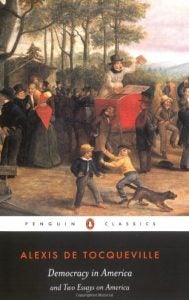 I mentioned at the top of the program that there are a couple of stories today to talk about how great Trump is doing, how great America is doing. I think there’s no better time to get into those than right now, following the McCain sound bite where he complains about Trump tearing apart — and Trump voters tearing apart — this new, this great world order that the United States created 75 years ago and has been leading for 75 years. And that somehow we’re abrogating our worldwide responsibilities, when nothing could be further from the truth.
I mentioned at the top of the program that there are a couple of stories today to talk about how great Trump is doing, how great America is doing. I think there’s no better time to get into those than right now, following the McCain sound bite where he complains about Trump tearing apart — and Trump voters tearing apart — this new, this great world order that the United States created 75 years ago and has been leading for 75 years. And that somehow we’re abrogating our worldwide responsibilities, when nothing could be further from the truth.
We’re trying to reassemble all of that! We’re try to put America’s greatness back together because for too many years it’s been under assault. Look. I’m repeating myself. But here’s the first story, and it’s by Jean Yarbrough. You probably have not heard of her. She is Gary M. Pendy, Sr. Professor of Social Sciences at Bowdoin College. That’s in Maine. I think it’s Bowdoin. It might be Bowdoin. I never heard it pronounced, I’ve only read it, and so I don’t really know how it’s pronounced.
She teaches courses in political philosophy and American political thought and her latest book, Theodore Roosevelt and the American Political Tradition, which was published in 2012, won the Richard Neustadt prize for best book of that year published on the American presidency. Now, this article of hers appears in the City Journal, and the headline: “Trump — and Tocqueville? For all his bluster, the president has championed values that built America, as Tocqueville saw it.”
Now, at the risk of insulting some of you, I need to explain who Alexis de Tocqueville was. (sigh) I doubt that Tocqueville is taught much in American primary and secondary education, and I doubt that Tocqueville is actually mentioned much in our so-called institutions of higher learning in academe. “Visiting the United States in 1831, when Andrew Jackson was president, Alexis de Tocqueville was appalled by the ‘vulgarity and mediocrity’ of American politics.
“After meeting Jackson, Tocqueville concluded that the low tone of American society started at the top. In Tocqueville’s estimation, Jackson was ‘a man of violent character and middling capacity.’ Worse, he seemed to have no talent for politics: he rode ‘roughshod over his personal enemies’ in a way no president had done and treated members of Congress with disdain.
“‘Nothing in all the course of his career had ever proved that he had the requisite qualities to govern a free people,’ Tocqueville wrote in Democracy in America, ‘so the majority of the enlightened classes of the Union had always been opposed to him.'” Now, Tocqueville ended up concluding just the opposite. Tocqueville wrote perhaps one of the best analyses and perceptions of why America is great. He’s French, obviously.
He wrote one of the best explanations and descriptions of this country by anybody — American, non-American. “Considering his view of Jackson, imagine what Tocqueville’s first impressions of President Trump might be. Real-estate mogul, host of The Apprentice, owner of beauty pageants, and backer of WrestleMania, among other louche enterprises, Trump would seem to confirm Tocqueville’s worst fears about debased standards of American public life and leadership.
“And yet, Trump campaigned on issues that have a Tocquevillean resonance. Put another way, Tocqueville highlighted certain dangers to democratic liberty and greatness that Trump — who, it is safe to assume, has not read Democracy in America — instinctively seized on to win the presidency.” Now, her reference to Tocqueville here highlights one of the negative aspects or observations that he had.
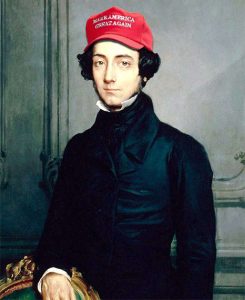 But in general, Tocqueville had an appreciation and an understanding for the United States that some even born and raised in America didn’t get, explanations of American greatness. It was all found, in his view, in America’s culture and morality and religiosity. Well, and America’s politics as well. Tocqueville is cited constantly by people who think America has lost its way. Tocqueville is viewed as… Go back and read Tocqueville’s description of America and you’ll find what we should be again.
But in general, Tocqueville had an appreciation and an understanding for the United States that some even born and raised in America didn’t get, explanations of American greatness. It was all found, in his view, in America’s culture and morality and religiosity. Well, and America’s politics as well. Tocqueville is cited constantly by people who think America has lost its way. Tocqueville is viewed as… Go back and read Tocqueville’s description of America and you’ll find what we should be again.
Now, Jean Yarbrough’s point is that “for all of his bluster,” Donald Trump has championed the values that built America and made it great as Tocqueville saw it. “Trump has reignited a great-party debate over the proper role of the administrative state in the American constitutional order. At stake is something more fundamental than material interest: It is the capacity of Americans to govern ourselves, both directly and through our elected representatives.”
And it is this self-government, the confidence and the freedom and the self-esteem that came from self-governance that Tocqueville cited as something he had never seen anywhere in the world. Literally, the American people ran their country — and, as such, America’s best interests were always on display, and America’s best self were always on display. It dazzled him and it blew him away. He wrote extensively about it.
Jean Yarbrough is saying that what really is happening here since Trump was inaugurated — it began during the campaign — is that Americans are once again demonstrating the capacity to govern themselves both directly and through elected representatives. In other words, Americans are now turning away from government as nanny, government as Santa Claus. Now, not everybody, obviously. There are still a lot of people that hate Trump.
But we’re talking about a trend here, and what Ms. Yarbrough is actually getting at is an explanation of why Trump is succeeding and why nobody can separate his supporters from him, and what that means in terms of what’s happening in America. It’s ultimately all good that Americans, a number of Americans (enough to win a presidential election) are turning away from the idea that every problem in life must be and can only be solved by government, that people are grabbing hold of their own lives again.
They are utilizing self-determination, which is causing a rising instance of confidence in a burgeoning number of Americans, a rising amount of satisfaction with their lives because there is much more control over those lives being exercised by people who are living them, as opposed to anointed administrative state people in bureaucracies in a far-away and distant capital. This is what she thinks is happening.
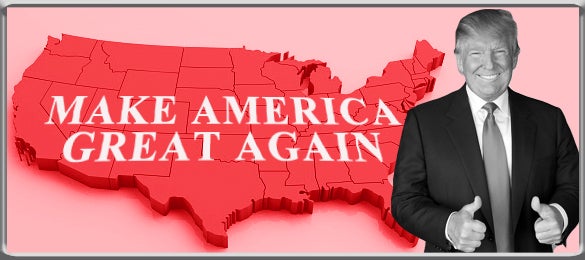 She writes, “Tocqueville had been struck by Americans’ love of country.” He hadn’t seen that anywhere else in the world: Love of country. As such, Tocqueville “would not be surprised by the appeal of Trump’s full-throated patriotism, especially when set against his critics’ championing of multiculturalism and globalization. For Tocqueville, national identity was bound up with religion, which, in the United States and in Europe, meant Christianity.”
She writes, “Tocqueville had been struck by Americans’ love of country.” He hadn’t seen that anywhere else in the world: Love of country. As such, Tocqueville “would not be surprised by the appeal of Trump’s full-throated patriotism, especially when set against his critics’ championing of multiculturalism and globalization. For Tocqueville, national identity was bound up with religion, which, in the United States and in Europe, meant Christianity.”
Tocqueville said that that was the foundational base of the greatness of America — and don’t forget the First Amendment. People talk about freedom of speech and so forth. The freedom of religion clause is why our founders fled Europe. They were denied the ability to worship as they pleased. It’s why the Pilgrims came and began it all. And when America, as constituted began to grow with that as the foundation, here was no stopping its greatness.
Because of the virtue and the morality that were contained inside of everyone’s religious beliefs. And this is what Tocqueville was literally blown away by. He had not seen it anywhere in the world. “Long before the 2016 presidential election, though, Democrats had clearly come to regard Christianity as an obstacle to their goals.” Now, why do you think that is? ‘Cause I think she’s right.
Why would Democrats think Christianity is an obstacle to their goals? Because it all relies on who is God. They want government to be God. That’s not an exaggeration. That’s not to be flippant. They will never say it. You have to ascertain this by looking at the way they live and what they consider to be inviolate. You cannot violate the tenets of climate change, for example. You cannot violate the tenets of much of their beliefs. Their beliefs are their religion. But Christians of course look to the God of creation, the God of the Bible.
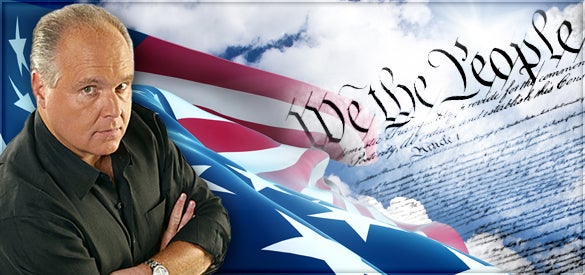 So there’s a competing God, and the Democrats and leftists everywhere, not just in America, leftists everywhere, communists especially need to wipe out God, the God of the Bible, because there can only be one God, and that will be the state. The old Soviets had all kinds of games they played with young kids to prove there was no God. And one of the simplest things they would do in a class of a bunch of sixth graders or the equivalent, first graders, too, bring in two potted plants.
So there’s a competing God, and the Democrats and leftists everywhere, not just in America, leftists everywhere, communists especially need to wipe out God, the God of the Bible, because there can only be one God, and that will be the state. The old Soviets had all kinds of games they played with young kids to prove there was no God. And one of the simplest things they would do in a class of a bunch of sixth graders or the equivalent, first graders, too, bring in two potted plants.
One of them they would ignore for a period of a week or so. The other they would water and nurture and care for, and they said the one they were ignoring they were leaving it up to God to protect and grow. And of course that flower, that plant died. It withered away. But the other potted plant grew and flowered and bloomed, and so the little kids were shown that there was no God. And if there was a God, look at how he didn’t care about that poor plant. If he didn’t care about that plant, he probably doesn’t care about me. But my state cares about that plant.
It was this kind of subtle and if that didn’t take, it wasn’t so subtle, psychological games that were played. And it’s always been one of the fundamental differences between — well, not always. The Democrat Party’s abrogation of God of the Bible is, in terms of our founding, somewhat recent. Meaning in the last 50 to 75 years.
“Trump’s campaign promise,” she writes here, “to ‘drain the swamp’ — by which he meant scaling back the administrative state that had risen up alongside America’s three constitutional branches of government — can be understood as an application of great-party principles. It represented an attempt to limit the power of government’s unaccountable, irremovable, and self-interested bureaucrats.”
Has not Trump focused on that? He’s focused on this, regulations. He’s constantly reminding many people how many regulations he’s nixed and gotten rid of and how many he’s going to continue to attack.
“President Trump has begun to deliver on his commitments to roll back intrusive regulations through executive order. He has taken on the education bureaucracy and called for expanding parents’ choices of schools, especially in America’s inner cities. His secretary of education has recently announced the repeal of Obama-era expansion of Title IX regulations affecting educational institutions receiving federal funds. He has reined in the Environmental Protection Agency’s ever-growing regulatory powers,” and they’re running around behaving like stuck pigs.
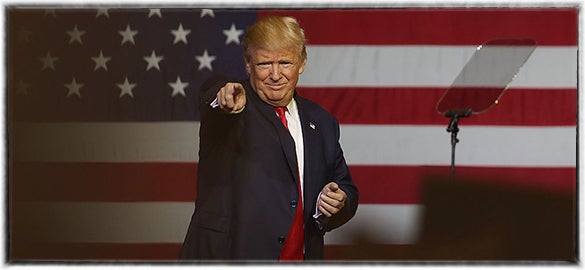 “He has promised to take a hard look at the Paris Climate Accords, which Obama signed without Senate consultation. He has trimmed financial regulations that impeded recovery from the Great Recession. And finally, his appointment of the judicial originalist Neil Gorsuch to the Supreme Court, along with his impressive lower-court nominations, signifies his intention to make sure that the federal judiciary fulfills its role of limiting executive power. In short, Trump has reignited a great-party debate over the proper role of the administrative state in the American constitutional order.” And this is what has overwhelming support and unbreakable bonds.
“He has promised to take a hard look at the Paris Climate Accords, which Obama signed without Senate consultation. He has trimmed financial regulations that impeded recovery from the Great Recession. And finally, his appointment of the judicial originalist Neil Gorsuch to the Supreme Court, along with his impressive lower-court nominations, signifies his intention to make sure that the federal judiciary fulfills its role of limiting executive power. In short, Trump has reignited a great-party debate over the proper role of the administrative state in the American constitutional order.” And this is what has overwhelming support and unbreakable bonds.
“At stake is something more fundamental than material interest: it is the capacity of Americans to govern ourselves, both directly and through our elected representatives.”
It is this sense of ownership of life again, of self-determination which is fueling support for Donald Trump. The left will never understand it. And if they ever did understand it, they would be opposed and scared to death by it and do everything they could to stamp it out by expanding bureaucracy and expanding the powers and role of government to tell you what you can and can’t do.
Self-determination, liberty, freedom, those are problems for Democrats who want people to think of government as the solution and the answer to everything. So that’s just one of these pieces. There’s another piece, Roger Kimball writing at AmericanGreatness.com titled, “Yes, Trump is Winning.” It’s an analysis of current events here and the things that Trump is doing that are not being reported that constitute just smashing the establishment, just literally pulverizing them.


